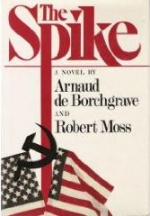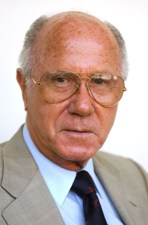Arnaud de Borchgrave
Arnaud de Borchgrave (born 26 October 1926) is a right-wing American journalist.
Early life and Education
Arnaud de Borchgrave was born in Belgium on 26 October 1926 to Count Baudouin and Audrey de Borchgrave (née Townshend). He was educated at Maredsous in Belgium from 1936 to 1939 and attended King's School in Canterbury from 1940 to 1942. He served in the British Royal Navy from 1942 to 1946, enlisting at the age of 15. [1]
Journalism
After leaving the British Navy in 1946 de Borchgrave spent a year working in Eastern Europe as a freelance writer. Then in 1947, shortly after his 21st birthday, he was appointed Brussels bureau chief for United Press International, and three years later he was the Newsweek bureau chief in Paris, then chief correspondent and at the age of 27 became a senior editor for the magazine. [2]
Borchgrave worked for Newsweek for over 30 years and was the magazine's chief correspondent from 1964 until his resignation in 1980. [3] According to Louis Wolf and Fred Clarkson, he was fired in 1980 "in part for keeping dossiers on fellow employees".[4]
After resigning from Newsweek de Borchgrave worked as a columnist and TV pundit and in 1981 was appointed a senior associate at the Centre for Strategic and International Studies at Georgetown University. From 1983 until 1985 he also co-authored 'Early Warning', a monthly intelligence bulletin. [5]
He was the editor-in-chief from 1985 to 1991 of the Washington Times and of Insight magazine between 1998 to 2001, both of which are publications owned by Sun Myung Moon's Unification Church.
He is currently editor-at-large for the United Press International - another Unification Church-owned media entity - and for the Washington Times. He has also been President and CEO of UPI. He is also director of the Global Organized Crime Project at the Center for Strategic and International Studies, where he was appointed as a senior advisor in 1991.[6]
Novels

In 1980 Arnaud de Borchgrave wrote a novel in collaboration with the Australian born right-wing journalist Robert Moss. The two men first met in 1972 when de Borchgrave was hiding out in England following a threatening phone call concerning an article he had written on the Munich Massacre. He stayed with his cousin who was chairman of The Economist and introduced de Borchgrave to Moss after the former asked if anyone at The Economist knew anything about terrorism and could advise him on his predicament. [8]
The two men stayed in touch and as de Borchgrave explained: “We eventually realized that between us we knew most of the intelligence directors in the Western world. We decided to pool these assets to gain access to the major defectors from Soviet intelligence, to see what they could tell us about 'disinformation' and manipulating the media.” [9]
The result was a bestselling novel called The Spike ('Spike' is newspaper jargon for when an editor refuses to run a journalist's story). It told the story of 'a young journalist who, in an effort to prove his suspicion that the media have made the public insensitive to the Soviet Union's plans for global supremacy, ferrets out the facts in Vietnam, Hamburg, Rome, Moscow and even the White House.' [10] The book was marketed as ‘The chilling tale of KGB manipulation in the Western media: a story so EXPLOSIVE it can only be told as fiction!’ [11]
Robert Moss and de Borchgrave later collaborated again on Monimbó, which was published in 1984. The novel centred around a New York journalist who uncovers a Cuban led plot to, as the Washington Post put it, 'foment racial insurrection and create moral decay in the United States'. [12]
Memorable quotes
In 1978 he told a Covert Action Information Bulletin editor:
- … he considered his "key, best sources of information" in the world the heads of "intelligence services in Washington, London, Tel Aviv, and Pretoria, each of which I stay in close contact with." Despite such open reliance on close intelligence ties, de Borchgrave claims coyly nowadays that he spurned two CIA recruitment approaches.
—Louis Wolf, Fred Clarkson, op. cit. p. 35.
- Asked whether the United States engages in disinformation, de Borchgrave said that present and former U.S. officials trying "in a free society… to put the best face possible" on what they are doing or did in government is not disinformation "That is called management of the news."
—Louis Wolf, Fred Clarkson, op. cit. p. 35.
Disinformation Agent
William Preston and Ellen Ray wrote a history of disinformation in the U.S., and observed:
- The greatest assistance in disinformation – especially during the current Administration – is always forthcoming from the Reader's Digest. In 1977 the Times exposed Digest editor John Barron as having worked hand in glove with the CIA on a book about the KGB. Other fraudulent journalists like Robert Moss, Arnaud de Borchgrave, Daniel James, Claire Sterling, and Michael Ledeen, among others, seem to pick up disinformation themes almost automatically. In fact, coordination between the development of propaganda and disinformation themes by the covert media assets, the overt propaganda machine, and the bevy of puppet journalists is quite calculated. A theme which is floated on one level – a feature item on VOA about Cuba for example – will appear within record time as a lead article in Reader's Digest, or a feature in a Heritage Foundation report, or a series of "exposes" by Moss and de Borchgrave or Daniel James in some reactionary tabloid like Human Events or the Washington Times or Inquirer. Then they will be called to testify by Senator Denton's Subcommittee on Security and Terrorism, repeating one another's allegations as "expert witnesses".
After that they are given credibility by the "respectable" Cold War publications like the National Review, Commentary, and the New Republic. And finally, since they have repeated the theme so many times it must be true, they are given the opportunity to write Op Ed pieces for the New York Times or the Washington Post.[13]
The recanting peace-activist hoax
Borchgrave was instrumental in laundering a story about a recanting peace-activist who "saw the light" in Iraq before the war. Although Joseph went to Iraq to protest against the impending war in 2003, while in Baghdad, he changed his mind, and now favored the war. It transpires that this was a hoax, there was no "Kenneth Joseph", and the details can be read here.
Affiliation
- Benador Associates
- CAUSA (affiliated to Unification Church) -- setup during the 1980s to counter US-campus sympathy for the revolutionary movements in Central America. It also sought to put the Contra leadership in best light, despite the fact they were CIA agents. On the other hand it sought to tarnish the image of Daniel Ortega, and all the Nicaraguan Sandinista leadership. Unification Church students of Latin American descent were sent to the main US-campuses to spread the CAUSA magazine.
- Center for Strategic and International Studies – Senior Adviser and Director (2005); Transnational Threats Initiative program
- Central Intelligence Agency
- Committee for the Free World
- Diligence
- National Legal Center for the Public Interest – Director
- NewsMax.com – Board of Directors
- Newsweek – journalist/editor until 1985.
- Unification Church
- United States Committee for a Free Lebanon – Listed as "expert".
- UPI – Editor in chief
- U.S. Global Strategy Council – Board of Directors
- Washington Times – Editor in chief
- World Strategy Network
External links (date order)
- William Preston, Jr. and Ellen Ray, "Disinformation and Mass Deception: Democracy as a Cover Story", Covert Action Information Bulletin, Spring-Summer 1983, No. 19, pp. 3–12. (contains photo of Borchgrave in "Rhodesian army gear, one of his favorite outfits.")
- Louis Wolf and Fred Clarkson, "Arnaud de Borchgrave Boards Moon's Ship", Covert Information Information Bulletin, Summer 1985, No. 24, pp. 34-35.
- Fred Clarkson, "Behind the Times: Who Pulls The Strings at Washington's No. 2 Daily?", FAIR/Extra!, August/September 1987.
- Arnaud de Borchgrave, "Lucky Break for Jordan", UPI, March 21, 2003.
Publications
- Arnaud De Borchgrave, Robert Moss, "The Spike", Outlet, April 1980. ISBN 0517536242
- Arnaud de Borchgrave, Frank J. Cilluffo, Sharon L. Cardash, Michele Ledgerwood, Csis Homeland Defense Project, "Cyber Threats and Information Security: Meeting the 21st Century Challenge", Center for Strategic & International Studies, May 2001. ISBN 0892063882
Contact, References and Resources
Contact
- Phone: (202) 775-3285
- E-mail: adeborch@csis.org
Resources
References
- ↑ The Complete Marquis Who's Who, 5 March 2009; Major Issues Lecture Series, Topic: Media Responsibility vs. National Security Tuesday, 16 Dec 1986.
- ↑ The Complete Marquis Who's Who, 5 March 2009; Major Issues Lecture Series, Topic: Media Responsibility vs. National Security Tuesday, 16 Dec 1986.
- ↑ The Complete Marquis Who's Who, 5 March 2009
- ↑ Louis Wolf and Fred Clarkson, "Arnaud de Borchgrave Boards Moon's Ship", Covert Information Information Bulletin, Summer 1985, No. 24, p. 35.
- ↑ Major Issues Lecture Series, Topic: Media Responsibility vs. National Security Tuesday, 16 Dec 1986.
- ↑ The Complete Marquis Who's Who, 5 March 2009
- ↑ The Times, Thursday, Jul 17, 1980; pg. 11; Issue 60679; col F
- ↑ Edwin McDowell, ‘Behind the best sellers Arnaud de Borchgrave and Robert Moss’, New York Times, 22 June 1980
- ↑ Edwin McDowell, ‘Behind the best sellers Arnaud de Borchgrave and Robert Moss’, New York Times, 22 June 1980
- ↑ 'Bestsellers', New York Times, 8 June 1980
- ↑ The Times, Thursday, Jul 17, 1980; pg. 11; Issue 60679; col F
- ↑ 'On the Machete's Edge', Washington Post, 7 August 1983
- ↑ William Preston, Jr. and Ellen Ray, "Disinformation and Mass Deception: Democracy as a Cover Story", Covert Action Information Bulletin, Spring-Summer 1983, No. 19, pp. 3–12.
